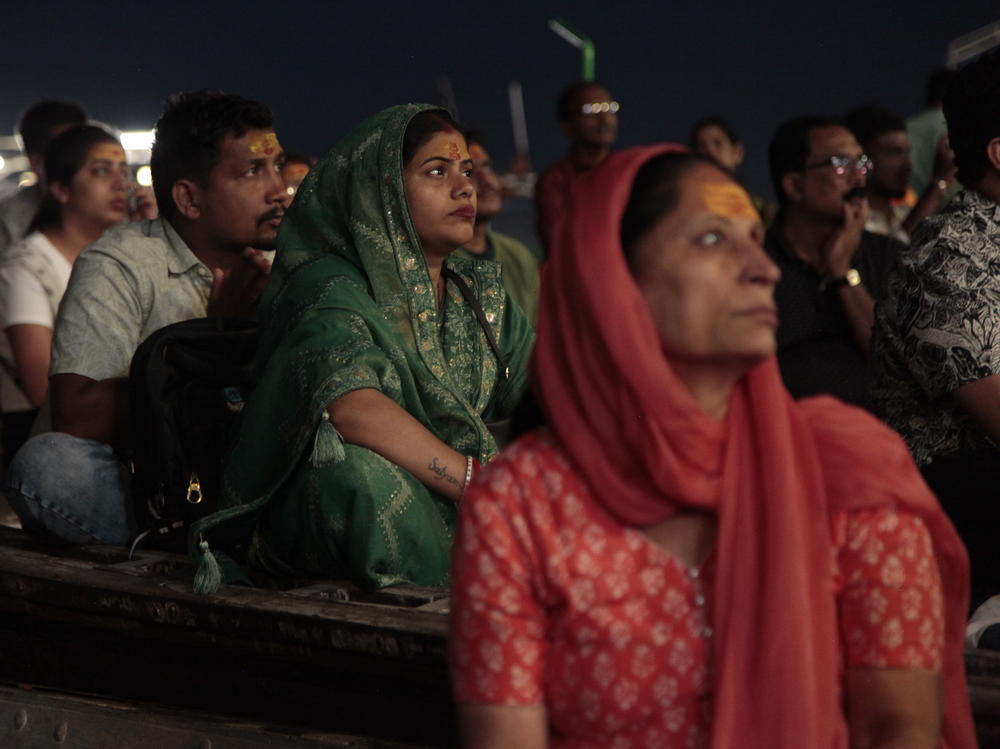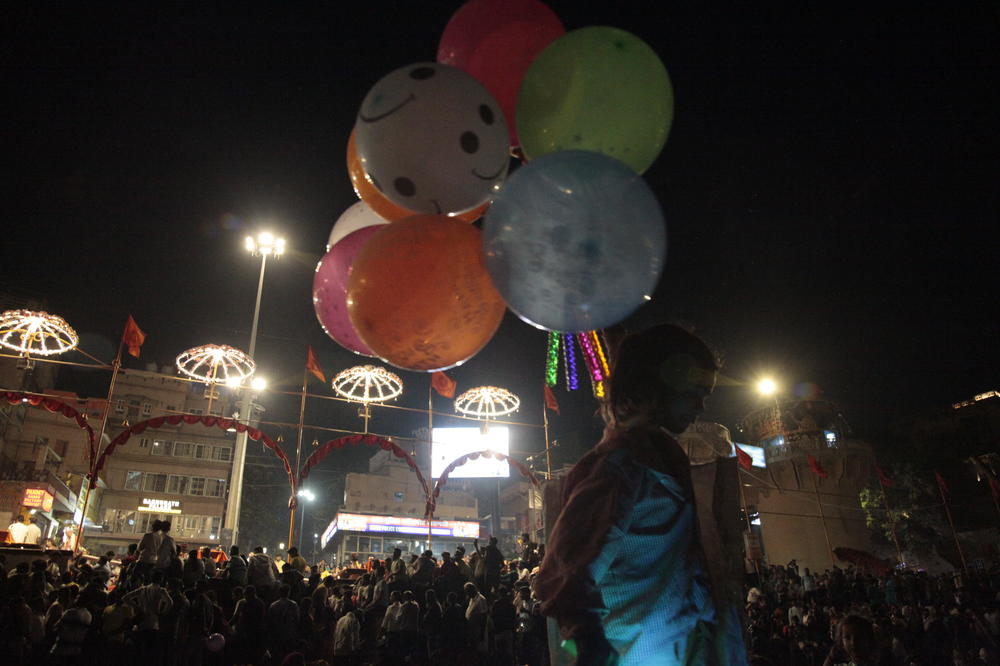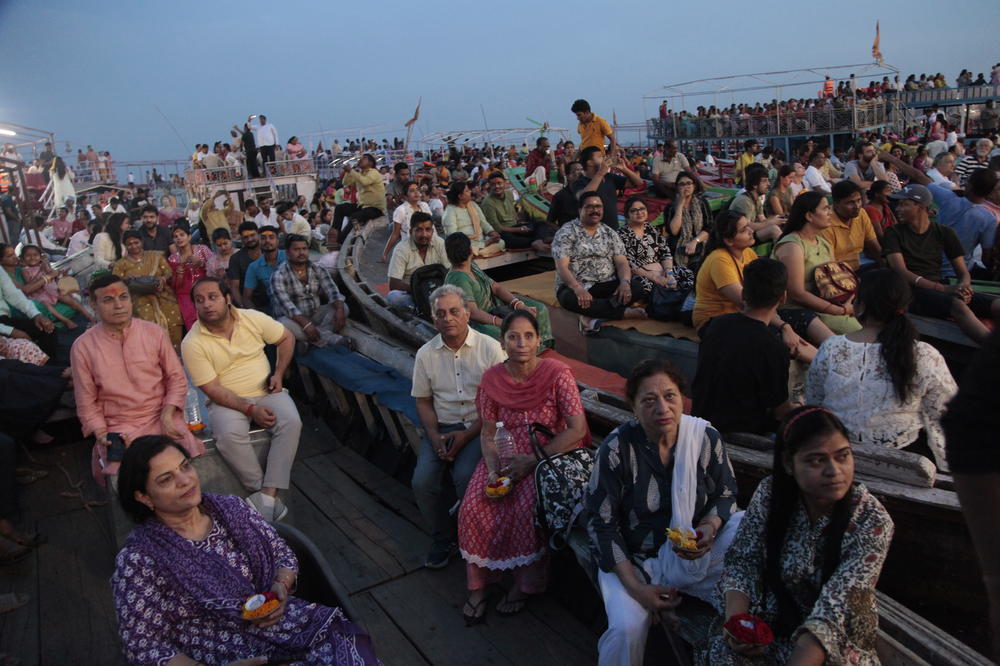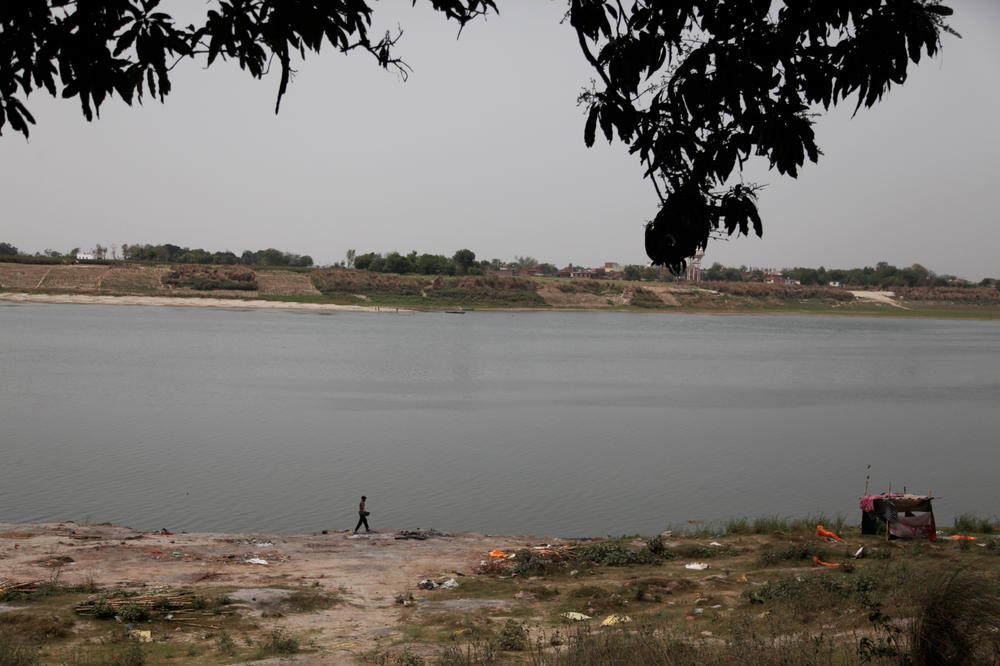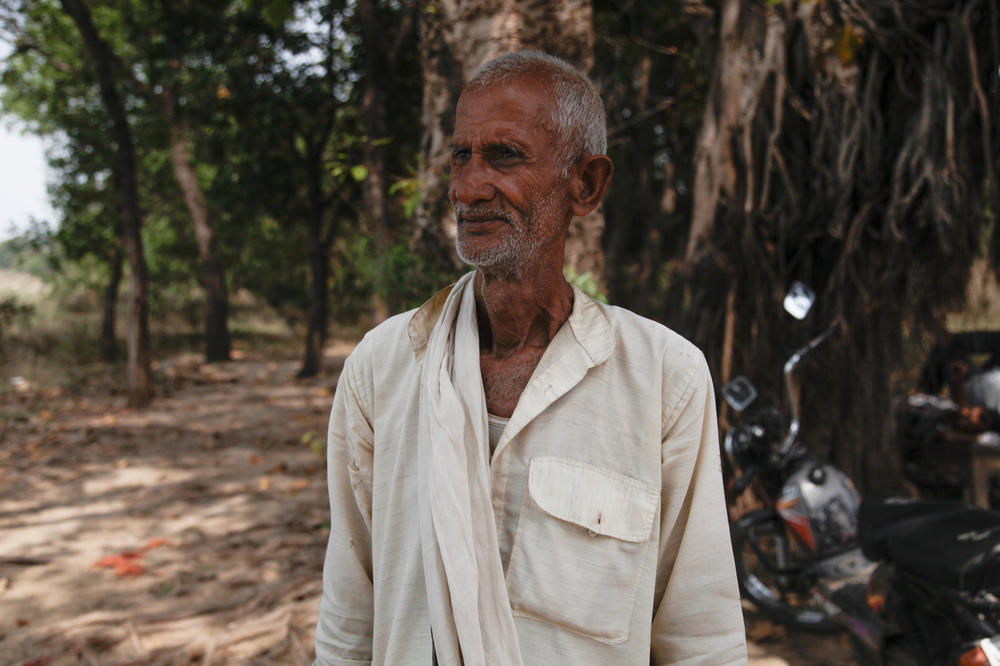Section Branding
Header Content
Up and down the Ganges, India's Modi enjoys support after 10 years of rule
Primary Content
VARANASI, India — Hindu priests stand on the banks of the Ganges, performing an evening prayer to the river. They wave fire as the sun sets, ring bells and tap on drums. Thousands watch, clap and chant along from boats crammed in the water. They're here because this is Varanasi, a city deeply holy to Hindus, as holy as the Ganges River, which many reverentially call ma — mother.
It's also the constituency of Prime Minister Narendra Modi and his Hindu nationalist Bharatiya Janata Party (BJP). Modi is not from here — he was raised in a town in Gujarat, in western India — but representing Varanasi, in India's north, is important because Modi and his party have pledged to remake India as a Hindu nation. That poses a sharp turn for a country whose constitution enshrines secularism and equal rights.
Modi has renewed the pledge with India in the midst of its mammoth elections. Nearly a billion people are eligible to cast ballots in voting that started April 19 and takes place in stages for six weeks. Results are expected June 4, but the outcome is unlikely to surprise.
Analysts say Modi will likely be elected to a third consecutive term, a feat only achieved in India over 60 years ago by the country's founding father Jawaharlal Nehru of the Indian Congress Party. NPR traveled along a stretch of the Ganges River to understand the sway that Modi holds after a decade of rule. This area will vote on June 1, in the last stage of the elections.
Residents gush praise for Modi
The prayer ends, and boats whir back to the river bank. Tour guide Mahesh Banguru steps back onto shore and says, "I want Modi to guide our country as long as he lives." That's a possibility — India does not have term limits for prime ministers.
Banguru says Modi has righted India's history after centuries of Muslim and British domination. He approvingly notes how Modi consecrated a temple to the Hindu deity Lord Ram in January, built on land where rioters once destroyed a medieval mosque over three decades ago in the northern city of Ayodhya, triggering communal violence across India that killed some 2,000 people, mostly Muslims. Hindu nationalists were whipped up by a BJP campaign and believed the mosque was built on the site of Lord Ram's birth.
"We Hindus waited hundreds of years for that," he says, "and because we follow God, we've even landed on the moon." That's a reference to India's historic August landing of a rover near the lunar south pole, the first country to ever do so.
A businesswoman says Modi is not corrupt, like other politicians. A student says Modi has made cities cleaner, and safer for women and girls like her.
"Modi is like, divine, he's worshipped, beloved," says Najma Parveen, a rare Muslim woman who campaigns for the prime minister. "People aren't voting for the BJP. They're voting for Modi."
Most Muslims in India — a large minority of about 200 million people — vote against the BJP. Muslim community members, human rights groups and critics of the government say Modi and his party have fueled hatred against Muslims, including by inciting riots to demolish a mosque to build a Hindu temple and passing laws that Muslims fear will render them stateless.
Parveen, however, credits Modi with his government's achievements: rapid economic growth, dizzying rollout of infrastructure like bridges, roads and airports, and India's growing global prominence. But she says he's not to blame for India's problems: low wages, high youth unemployment and, high food inflation. Parveen says the prime minister will fix these problems in his third term.
Nearby, a historian and communist named Dipak Malik says the country's problems don't seem to stick to Modi because the prime minister connects his followers to a greater Hindu cause, like when Modi consecrated that temple to Lord Ram in a broadcast ceremony. "It takes away your breath," Malik says, "and you lose track of what is happening in the real world."
Modi's face is everywhere
Helping along that persona, Modi, 73, portrays himself as a benevolent father. His face is everywhere, from highway billboards to newspaper ads to bags of free food staples. The government has distributed the aid bags to about 800 million people, nearly two-thirds of India's population, since 2020 when the coronavirus pandemic hit folks hard.
Malik says much of India's television press and social media has become loyal to Modi. And the party's coffers are full, from a now-outlawed policy that allowed companies to donate anonymously, earning the BJP more than $720 million.
With these advantages, the BJP is campaigning to expand its control of the lower house of parliament from 303 seats to a supermajority of 400 out of a total 543 seats. To get there, the party is trying to win over the few districts of northern India not governed by Modi's BJP. One of those is a short drive from Varanasi, the country town of Ghazipur and its surroundings.
Off the main road, a cow ambles over to a trash-strewn field surrounded by homes. There, Kumkum Rai says people regret not voting for the BJP last time in Ghazipur. "It's like we dropped an ax on our own foot!" Rai says. She believes that if the BJP wins this seat, they'll develop Ghazipur. She says she imagines there would be an airport, a university, better roads — like Varanasi, Modi's constituency.
Not all are convinced. NPR followed two BJP campaigners for an evening. They've been tasked with speaking to dozens of people in Ghazipur. Heading down the street, they meet 80-year-old Phulmati, who only has one name.
They produce a large sheet, emblazoned with Modi's face, listing dozens of government initiatives. The campaigners run down the list with Phulmati: Did she get a government-issue toilet? Yes. Does she receive free food staples? Yes. The message is clear: She should be grateful to Modi.
Phulmati isn't impressed. "I gave my vote to Modi last time but it didn't help me," she says. Her free food staples ended after she lost her ID card. She says the garbage is never collected, the drains are never cleaned. "Don't say that," one of the party campaigners chides. "Talk about the benefits you got!"
The pandemic left its toll
A few hours' drive down the Ganges, in the isolated, hardscrabble village of Chausa, an older man is sitting by the river. He has one name, Shivanandum, and few teeth, and wears tattered clothes. He guesses he's 80 years old. He conducts the last rites for Hindus before their bodies are cremated by the riverbank, their ashes submerged in the Ganges.
He says, at one point during the pandemic, corpses washed up here for six weeks as deaths from COVID-19 surged. "I didn't know whose bodies they were," Shivanandum says. He says police set up barricades to stop people from dumping bodies in the river.
Shivanandum says he conducted the last rites for as many bodies as he could. Some were cremated. Most, he says, were buried 10 at a time in mass graves dug up by government workers. He gestures to the grassy mounds by the riverbank: "There they are," he says. "It was a nightmarish time."
Did it affect how he will vote? He says, "I can't forget what I saw," but ultimately, he points to his stomach. "Once I eat, then I'll know," he says — he'll vote for who promises free food.
Down the road is the former mayor, Brij Bihari Singh. His phone keeps ringing — he's got cows for sale in the village fair. Between calls, Singh says, Modi can't be blamed for the government's failings. "The government is me and you," he says.
Singh describes Modi as a visionary, leading India onto the global stage, injecting Hindus with pride and working for the good of India. "Whatever decisions he makes, he makes in the people's interest," he says. "Modi is a gold prime minister. We are lucky to have him."
